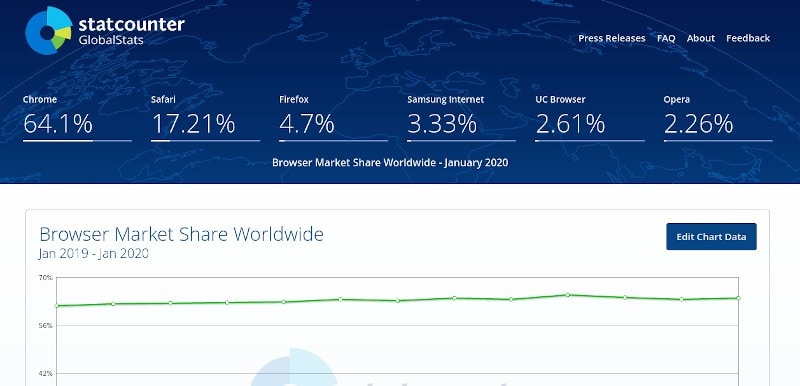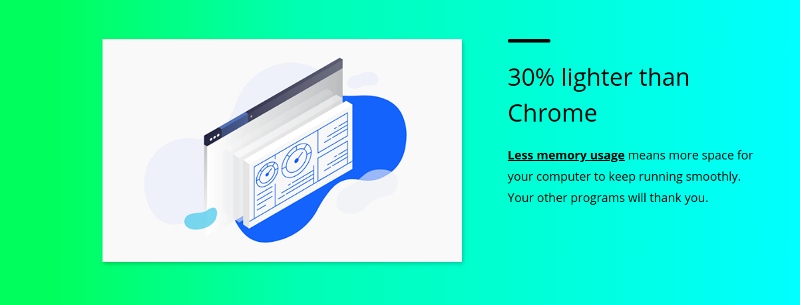Brief: Here’s why Mozilla Firefox should be your choice in the effort to protect your privacy and in keeping the internet healthy and an open place.
Browser choice is a very personal thing. I notice that people have a sort of, love towards the browser that they have been using for a long enough time. What I mean by “love” is that it is quite difficult to make someone change their default browser. Ask Microsoft, they have tried.
Let’s say your favorite browser is Chrome. Now even if I tell you that some xyz browser consumes 30% less memory than your Chrome, I doubt that you’d even consider switching to my xyz browser. I agree that Google Chrome is a great browser. As of February 2020, Google Chome is the most used browser with a market share of 64.1%.

Personally, I use Chrome a lot too. It’s the fastest browser out there. Its password manager and sync services are just awesome. Chrome on my PC syncing everything with Chrome on my phone is so convenient. Its autofill makes signups and forms so quick and relaxing. And the apps from the Web Store make Chrome feel like a mini operating system in itself. Chrome is so much more than just a web browser now. To top it all off, it’s all for free! Or is it?
Google doesn’t want you to pay with money for using Chrome. Rather it wants you to pay with your personal data. It wants to snoop, spy and stalk you.

But it’s not like a person at Google is personally going through your emails and data. No, I don’t want to make you afraid of Google or mislead you regarding the way Google handles your data. Google is very trustworthy with your data. It uses all your data to serve you ads and nothing else. It handles your information in a very professional manner. The data is stored securely and only computers access it to determine what kind of ads are more suitable for you.
But what if you don’t want Google to have your data, no matter how trustworthy they are. You would be right to have that stand as Facebook-Cambridge Analytica scandal and the attack on Facebook in September 2018 left 300,000 and 50 million users vulnerable respectively. And our own Google Plus social network has admitted a flaw that exposed 500,000 users to the third party.
So is the internet a safe place for your data if the biggest names in the industry themselves cannot protect your personal data?
The answer is a very big no. And you should be actively protecting yourself from this threat.
The thing about using Google Chrome is, your gateway to the internet also is Google’s gateway to your private data. The pages that you visit, your searches, the time you spend on particular sites, everything is sent to Google. Even when Google is doing everything to keep your info safe, it still, does put you in a very vulnerable position.
Note: As I mentioned already, choosing a browser is your personal choice. So, this article is completely based on my opinion alone.
How do you protect yourself?
The very first step would be to switch to Firefox. The thing about Firefox is, it comes from Mozilla, which is a non-profit organization. Mozilla does not seek to make huge profits from collecting user info and selling it or using it to serve ads.
Mozilla Firefox is an open-source project. Which means anybody can have a look at the code and see how it works and what exactly it does.
Mozilla Firefox does not send your private info to its servers or any third-party partners. It sends some statistical data that is non-intrusive, anonymous and is used only to improve Firefox.
Firefox browser has features such as Tracking protection to make sure that websites do not track your online activities across multiple sites, something that Facebook does very intrusively.
And, when you add the new enhanced tracking protection feature enabled by default (and a cross-site tracking cookie blocker), Firefox is a gem for privacy-concerned users. The Lockwise and password monitor feature also acts as a cherry on top for all the good features offered with Firefox.
Is Monopoly good?
If there was only one Pizza shop in your city. Only one. Then You’d probably have to pay what the pizzeria asks you to pay. And what if they put pineapple on every pizza? If you complain, they would just ask you to take it or leave it.
But if you have 2, 3 or more pizza shops in your city, well the cost would be regulated as a result of competition, the quality would increase and the pizzerias would try to keep you happy with a variety of pizzas, with and without pineapples. Okay, why are we talking about pizzas here?
Consider this scenario. Google Chrome continues rising and
The above scenario is highly unlikely but still is very Googley. Android is an open source operating system from Google. But the user experience on it, is a pleasurable one, vastly because of Google Play Services which is proprietary. Without Google Play Services and Google apps, Android would be utterly unusable, at least for me. And Google reportedly will charge $40 to preload Google Apps in the European market. But we have alternatives if we don’t like the terms and conditions for using Android.
But do we have an alternative to the World Wide Web?
Protect the Web
Firefox is very passionate about protecting the openness and freedom of the web. And as the second-largest browser, it is our best bet at keeping a healthy and open web. Firefox has been supporting and promoting the use of open source web technologies and the freedom of the web users against being tracked and spied on.
Do you really want an internet where personalized ads are shoved down your throat every time you open the browser? Remember, in the advertisement business YOU are the product.
By using the Firefox browser, you take a stand. You say it out loud and clear that it is not Ok to track your every movement online. You are not a digital slave.

Start a change
Now I’m not saying that You need to uninstall Google Chrome and burn your computer. No. I’ve admitted that Google Chrome is a great browser in terms of user experience and I stand by it. I also understand that you’ve grown dependent on Chrome. And it’s OK.
You can start small. Install Firefox on Your computers. Start using Firefox when you need to do a quick search. Start using Firefox just for your Facebook. Firefox is really a pleasure to use.
I’m not suggesting a planned revolution against Chrome. Just use Firefox whenever you can. By doing to You are sending internet traffic through Firefox. That’s might be just a simple act. But it has a huge effect on protecting the openness and the freedom of the web.
And even if You decide to switch to Firefox completely, it’s not that difficult. Firefox too has its own sync service which pairs your desktop Firefox to Firefox on your smartphone to provide you seamless cross-device browsing experience.
How does Firefox perform?
With the latest Firefox Quantum update, Firefox has caught up to Chrome in terms of speed and even beats Chrome in certain areas. Now, Firefox may not be faster than Chrome on load times for you (depends on the web pages you access).
According to the official Firefox blog itself, Firefox is actually milliseconds slower than Chrome. But when we’re talking milliseconds, it’s a unit of time that is not even perceived by humans. Anyway, we’re talking just a 4-millisecond difference. But there’s a very major area where Firefox trumps Chrome.
We all know that Chrome is a memory hog. And with pretty much every website turning into a heavy, resource-intensive, web-application, the memory becomes pretty important. And once memory starts getting filled up, swapping comes into place, leading to drastic slowdowns.
Now Firefox has an improved engine which very effectively addresses this issue. Firefox Quantum consumes 30% less RAM than Chrome. This means that you enjoy a much more responsive web interaction and a better overall web browsing.

And there’s a hardware acceleration option in Firefox (disabled by default), which when enabled shows a ridiculous improvement in the rendering quality, textures, the speed and the interactivity of the websites. You can see how to enable it here. I highly recommend that you give it a try. If you do not like it or feel your CPU and GPU working extra hard, you can disable it.
Wrapping up
In a world where large tech companies are finding newer ways to lock down the internet (net neutrality) and finding ways to make money out of it, Firefox has been trying to protect what is rightfully ours.
Firefox is more than a browser. It’s a movement trying to protect the internet. It’s trying to keep the internet healthy and an open place. And it needs your help to do so. And as I’ve said above, you can start small. Do share this article with your friends and encourage them to give Firefox a try. And Your comments are always welcome. Cheers.

